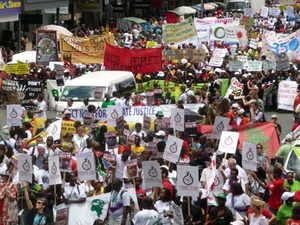DURBAN, South Africa - The UN climate talks in Durban are the last chance to agree on how the world should address the challenge of the ever-increasing greenhouse gas emissions after the Kyoto Protocol expires next year. But this current lack of agreement may lead to negotiating strategies the world has never seen.
This Friday, December 9, the world’s eyes will be on South Africa’s Durban, where the 17th Conference of the Parties will draw to a close.
After the Copenhagen disappointment two years ago, the exceptionally talented and charming Juan Rafael Elvira Quesad, head of the Mexican Secretariat of Environment and Natural Resources gathered the world’s good will at last year’s negotiations in Cancun to send humankind on the way forward toward a new climate deal. This year is the world community’s last chance to reach an agreement about how the emissions crisis must be handled after the Kyoto protocol expires in 2012. It may also be the last opportunity to salvage the outdated UN system, which is based on the principle of forging agreement between nearly two hundred member nations.
The US and the EU played a central role in the UN climate negotiations process in the 1990s, when 37 richest countries agreed to reduce their overall emissions of greenhouse gases by five percent by 2012 relative to 1990 levels. Later, the EU made sure that the Kyoto Protocol came into force, even as the U.S. tried to cajole Russia to refuse. Today, the EU is helping Russia acquire its membership in the World Trade Organisation (WTO), a token of appreciation for having ratified Kyoto.
 Photo: Foto: Bellona
Photo: Foto: Bellona
But much has changed since Kyoto came into force. Last year China surpassed the United States as the world’s largest source of CO2 emissions. This past summer, the total amount of emissions produced by China, India, Brazil and other developing countries combined exceeded that of the 37 Western industrialized countries. The EU’s share of greenhouse gas emissions fell from 15 to 11 percent of total global emissions. The United States and Canada’s emissions rose sharply and overall, global emissions of greenhouse gases have grown significantly over the past two years.
Small countries such as Norway, Switzerland, and New Zealand stand out as solitary swans in the fight against climate change. They are beautiful to behold, but they have very little political weight in the UN negotiations. They are too small to have any real market sway. They will obtain it when they align themselves with the 27 member states of the EU, the only region in the world with the statutory emissions reductions for the period beginning in 2012 through 2020. But the EU’s 20 percent reduction in emissions by 2020 will make little difference now that the U.S. and China, countries with decidedly the biggest pollution levels, are not willing to commit to a United Nations climate deal.
The way that negotiations look right now, the best hope is that we can come to an agreement to extend the emissions reduction commitments spelled out in the Kyoto Protocol. This will not mean bigger emissions reductions, but rather will ensure that industrialized countries maintain the needed climate measures and focus on further curbing greenhouse gas emissions. The EU, which has launched the proposal, is meanwhile putting forward a demand that the United States, Canada, and Japan join the effort, and that China show signs it is considering future participation. With an extension of Kyoto in everyone’s prayers, countries would commit to a roadmap for further negotiations toward a new global agreement in 2015. It would come into force in 2020 and contain specific and hopefully ambitious emissions reductions between 80 and 95 percent by 2050.
By 2015, the UN’s Intergovernmental Panel on Climate Change (IPCC) will have published its fifth assessment report, in which it will update its conclusions on the consequences, scope and dangers of advancing climate change.
If the Durban delegates fail to agree on future actions, a dangerous vacuum will emerge, and greenhouse gas emissions will accelerate further. According to the International Energy Agency, with today’s emissions levels rising at an alarming pace, global temperature may increase by 6 degrees Celsius before the end of the century. Absent a new agreement, the EU countries, and hopefully, Norway, Switzerland and New Zealand, will be called upon to take the lead with their legally binding targets. But then it will also be their duty to introduce measures to protect economic competitiveness and jobs in order to avoid carbon emissions accumulation in countries not bound by any climate obligations. That is hardly ideal when one considers the importance of global trade growth, but all the warning signs are there that climate change is the greatest challenge of our time.





